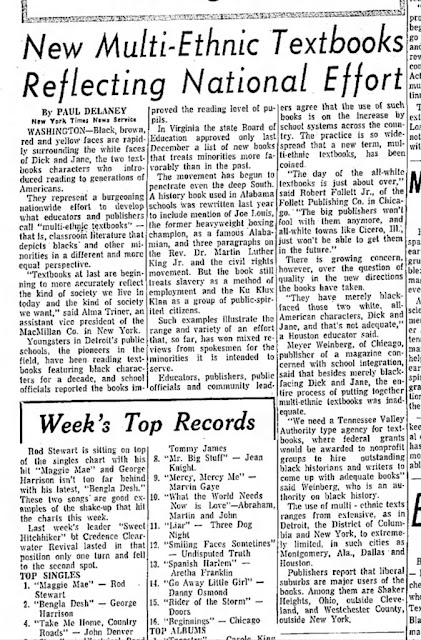1971 “The history of the American Indian is terribly inaccurate,”... history “is a fraud, the approved version of events written by the establishment.”
New Multi-Ethnic Textbooks
Reflecting National Effort
1971 Aug 27, Nashua Telegraph
… “Textbooks at last are beginning to more accurately reflect the kind of society we live in today and the kind of society we want,” said Alma-Triner, MacMillan Co.
… The movement has begun to penetrate even the deep South. A history book used in Alabama schools was rewritten last year to include mention of Joe Louis, the former heavyweight boxing champion, as a famous Alabamian, and three paragraphs on the Rev. Dr. Martin Luther King Jr, and the civil rights movement. But the book still treats slavery as a method of employment and the Ku Klux Klan as a group of public-spirited citizens.
 |
| 1971 Aug 27, Nashua Telegraph |
Denver – “The history of the American Indian is terribly inaccurate,” a historian said in Denver.. The fact that most Indians live isolated lives on reservations and have almost no political power has kept them from properly entering the history books, he added. Peter Farb, a consultant with the Smithsonian Institution in Washington and curator of American Indian Cultures at the Riverside Museum in New York, said history “is a fraud, the approved version of events written by the establishment.”
Farb said the problem with Indian history is mainly that it is written by whites. “And in cases where the Indian had the opportunity to speak,” Farb said, “the participant is not always the best one to write history, either.” … the Indians “has a long way to go before his history is written correctly.” Complicating this problem, Farb claims, is the fact that “the powers-the-be are just not going to let themselves be put in an unfavorable light.”
Farb added that Indian history will continue to suffer for a while, “because there’s no profit in it, like there is in black history. New York publishers are scrambling right now for black history because the blacks are in the universities, they’re organized, articulated, and well-funded.” Meanwhile, he said, the only interest shown in the Indian has been “of the headband and bead kind – the fads.”
 |
| 1971 March 7. The Montana Standard |
Indian History Hit;
Lobbying Backed
1971 March 11, The Times Standard
Kansas City – History books now used demean the American Indian and should be replaced, panelists were told ... at the National Conference on Indian Self-Determination.George Lee, of the Indian Education office of the Department of Health, Education and Welfare, said the office was working to get the textbooks replaced in all states.
“Children siting the classroom looking at the floor,” h e said, “embarrassed about what is in the textbooks.”
Lee said concern for Indian education was at a peak and asked for specific information funding needs for specific information funding needs for local educational programs ….
Earlier, the conference, attended by some 500 delegates representing 200 tribes, was criticized and some of its leaders were called apples.
“The old-line leaders, the apples – red on the outside and white on the inside – are hanging on to their last vestige of power,” said Russell Means.
He is executive director of the American Indian Movement (AIM) in Cleveland and says his group has 44 chapters and an estimated 30,000 to 35,000 members in urban areas and reservations across the country. He is a member of the Sioux tribe…
 |
| 1971 March 11, The Times Standard |



Comments
Post a Comment